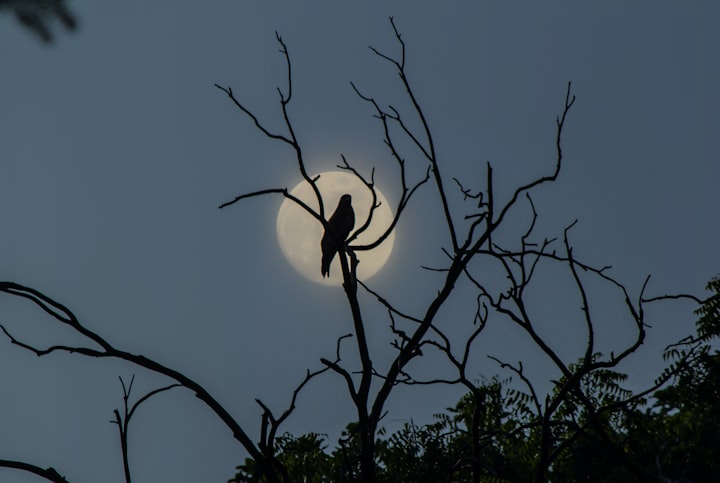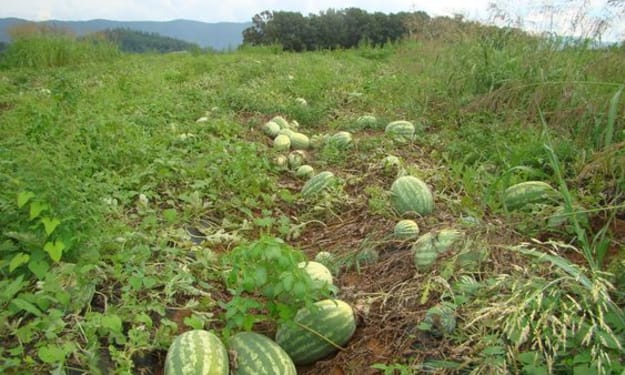
In a small town in northern Michigan there is a talking tree. Don’t ask the locals; they’ve never heard of it. Don’t set off on a search for a thing of majesty and splendor. It is a simple red maple set in the midst of a forest on an overgrown path that leads to nowhere. Though it has been in my family for four generations, I knew nothing of its existence or significance until several weeks ago. And in my heart I know its re-discovery was not mere serendipity but an act of a silent prayer.
It is in the northeastern corner of an fifty-two acre family homestead my father was about to sell. It was once a farm. Most of it. Potatoes and lettuce and carrots and other farm stuff. It fed the family and then some. How profitable it was I don’t know. Probably not very, it being northern Michigan, rather small, and very overgrown now.
We were going back to review the parcel, my dad and I, though it hardly a dad and son thing. It was business. Mom was gone; dad was retired and wanted to stay that way. He was going for a killing on the place, and I was his attorney, working cheap. Tugs at the heart strings, doesn’t it?
We had had a day and a half of rain. It was turning sunny, but it was still what we call raw. I opened the door of my Lexus and stared down into a rich palette of freshly mixed mud. I was looking for a patch of clean ground when I heard the plop and slosh of my father’s feet. Too late to ask him to be careful, wouldn’t have matter anyway. He had this philosophy about things as I recalled: everything old and dirty. That way, you can’t get ‘em any worse.
I tiptoed gingerly around the front of my car while he took a path of disregard. “So,” I said. “I finally get to see it.”
“See what?”
“The family farm.”
“Oh, that.”
Obtuse moments like that came naturally to him. When I was a kid we drove by an overturned pick-up on the side of a road. Paramedics were rushing a litter into the back of an ambulance. “Wonder if someone died,” I said. “Where?” He asked. It was as if all he saw was the overturned truck and was wondering if the hubcaps were salvageable.
“When was the last time you were here?” I asked as I followed him past a battered split rail fence.
“Long time. Seen enough?”
He wanted out as badly as he never wanted to come in the first place. Technically, I could have drawn up the papers sight-unseen, but I forced the issued by telling him I needed to check the condition of the place. It was horrendous. I thought the fence was bad: the house was worse, a shell as worn and cracked as a mummified Egyptian. White paint chipped, peeled, gone altogether. A roof decades beyond the warranty period. Broken glass in the windows where there was any glass at all. There was a bush growing up through the front porch. Five more like-buildings and the place could be used as a Hollywood ghost town. And to think that six months ago my grandfather lived here.
“They’re gonna tear the mess down, anyway,” dad said, reading my thoughts.
I kicked at a root growing up through the exposed top of the septic tank. “Yeah,” I said.
“Ready to go?”
It was depressing, knowing it couldn’t have deteriorated this bad in just six months. “Grandpa lived here like this?”
“He wasn’t into upkeep.”
“But ... like this?”
“What?” Again with the blind eye.
“He shouldn’t have, you know,” I said, defiantly. “No man who has a family should live like this.”
He waved his hand at me in dismissal and barked, “Ahhh.”
He walked back to the car. I wouldn’t leave. I hit the automatic locks so he couldn’t soil the car, then walked behind the house. The forest and fields were beckoning me to meander. The stillness, perhaps. I felt a contentment, as if this weary place had no dark secrets, only treasured moments it wanted desperately to share.
I could see no trace of a farm. I knew from my legal research that the parcel was purchased in 1893 by Nigel Black, whom I calculated was my great-great grandfather. He built the house in 1896, the first four rooms, that is. It eventually expanded to ten with one bath. The progression of each build was impossible to decipher, most of it being done without permits back then. I’m sure one of those urban archeologists could figure it out by aging the wood and materials, but why bother. It wasn’t as if it was being registered as an historic site.
My father was back at my side. “You locked me out,” he said.
“What?” I said I, my how-do-you-like-it routine.
“The car. Mind opening it? It’s cold.”
“You could wait in the house,” I said.
I saw him sneak a peek at it behind us. “Looks like it’s about to collapse,” he said.
“Does, doesn’t it. Where’s the back property line?”
He peered ahead of us. “Can’t see it from here. Too many trees now.”
“When was the last time this was a working farm?”
“I don’t know, when I was a kid.”
“So what did grandpa do for all those years it wasn’t a working farm?”
He was about to answer. I saw the twitch of his lips that was meant to be a word or two. Then it was gone. “You here to write up the family history or the sale?”
“I know nothing about the man,” I said. “I saw him a handful of times in my life. We have a piece of property in the family for over a hundred and fifty years, and I’ve never been here. There’s a reason for that, and I’ve never asked. Now I’m asking.”
He pointed beyond us. “Down there.”
I began walking, not caring if he came along or not, and certainly not expecting that he would. There was nothing to mark my way. I glanced left and right, looking for the remnants of the rock or wood or barbed wire of the fence I was sure had been set up decades ago to mark the farm, but I saw none.
I’m not a tracker; my experience with the wilderness was limited to slipping into a grove of pines when I was a kid to experiment with cigarettes. That said, I was sure I was on a trail. Though it was nothing like you’d see in a state park, the ground was hardpacked and somewhat lower than the surrounding ground. A dry stream bed, then, I thought. But I saw no ferns of other stream-like features. Besides, after all this rain, it wouldn’t be a dry bed now.
I followed, letting my feet feel the way over scrub pines and fallen cedars. I had the plot map with me and reckoned I had to head northeast for about half-a-mile. Without a compass I had no clue where northeast was, without a pedometer I had no idea what a half-mile was. I followed my father’s finger and kept a lookout for the logical end of a nineteenth century farm.
About fifteen minutes later, I stood in a clearing before a thick, haggard tree whose left side was a gaping crescent-shaped gouge about four feet up the trunk, as if bit into by a monstrous beaver trying to haul it off to its lodge. “Talking tree,” my father said from the edge of the wood line behind me.
“That divot supposed to be its mouth?” I quipped.
He walked past me and up to the tree. He stood before it for a moment and gradually looked up, taking it in foot by foot, until his eyes met the sun peeking through the leaves. He cocked his head and retraced his route back to the gouge. With a reverence I had never seen in him, he approached and lay his palm in the wound, as if attempting to heal it.
I stood quietly watching him reliving a past I knew nothing of. He was in and out of our lives, often for months at a time. When he did return, he was silent about where he had been yet he always seemed to have money which he would hand over to my mother. I suspected it was but a token of what he really had, but it seemed to be enough pay the bills. Strangely, it wasn’t the absences that bothered me as much the silence upon his return.
It was during my Treasure Island and Huckleberry Finn period where I put him on a flight of fancy, exploring the East Indies, the pyramids, the lost empires, for riches which he would bring back to us. There he would sit with family and friends and mesmerize us with his stories. Reality was he’d get stinking drunk and sleep most of the day away, rising just as we were getting off to bed. I’d hear him rumbling around downstairs just before he headed out for the night. Those nights I didn’t hear him, I knew he was gone, and it got to the point I stopped asking my mother where he went and for how long. If she knew, she wasn’t saying, though I believed she never did.
“That’s what they called it,” he said.
“Who?”
“My dad. His dad. His dad’s dad.”
“The talking tree? Some kind legend?” I asked.
He put his hands in his pockets and backed away. “A story’s all it was; a silly story.”
I didn’t ask but he told me anyway.
“My great grandfather was clearing this final section out for farming.”
“That would be Nigel.”
“Yeah. Nigel. One day, he dragged my grandfather out of bed to help him cut the trees and bushes. It was five in the morning. Cold and rainy. Like today, I imagine. Grandpa went kicking and screaming. He was seven-years old and wanted nothing to do with anything outside of bed that early on a day like that. But Nigel grabbed his ax and bow saw, and made his sone take along his puny hatchet for the smaller brush. I don’t guess he needed the help, but he wanted his kid to start working the farm. That was early nineteen hundreds. They started them early back then, the kids, needed to.”
He was still staring at the trunk, and I wondered if it was me he was relating the story to or his talking tree.
“On the way out to the tree Nigel lectured the boy on responsibility and discipline, on the need to sacrifice one’s comfort for the family and others. The kid didn’t get it. He bitched and moaned and told his father how he’d catch his death of cold and die right there in the woods and wouldn’t mama get mad at him for that.”
“What did Nigel say?” I asked, mainly to bring him back to the present.
“Said mama wouldn’t care because she was sick of preparing so much food for them all.”
“He said that?”
“So the stories go. And then Nigel did something crazy.”
I had visions of a horrifying family secret, of his going berserk and hacking his son to pieces, or vice versa.
“Nigel began to chop at this red maple here while son swung wildly at the smaller stuff with his hatchet, crying and doing no good whatsoever. Rather than get angry, Nigel threw his ax down, took up the little hatchet, and began to chop the maple. Then he gave it to grandpa and the two swapped chops until grandpa’s hands bled. Whenever they came back after that they brought just the hatchet.”
“Why’s the tree still here?” I asked.
My father shook his head. “Damned if I know. You’d think it’d be dead. These trees only live a hundred- fifty years. From what I know it was full grown back then, and they take seventy, eighty years to do that. So it probably sprouted in the early eighteen hundreds.”
He finally turned to look at me. “That sound about right to you?”
I added it up sloppily in my head. “Something like that,” I said. “Couldn’t have been a very long tradition, whacking away with a hatchet. It’s still here.”
I saw the first genuine smile on his face I could remember. “No, it was a very long tradition. Right up to August twenty-fifth 1965.”
In a life that seemed to me to have no anchor points, I was amazed that a day over fifty years ago could come to him so readily.
“You know,” he said, “I don’t think the tree’s been cut at since.”
I approached the tree and touched its wounds. There were jagged scars, healed over as if grafted by an inept surgeon. I knew nothing of trees except what I gathered from a case against the Department of Natural Resources my firm handled: if you chop at them long enough, they die. Yet there it stood. Almost waiting. “What happened in 1965?” I asked.
“Two things: my eighteenth birthday and Vietnam.”
“I never knew you fought in the war.”
“I didn’t. I took the poor boy’s draft dodge: I went to Canada.”
“And grandpa didn’t like that?”
“We took our few token chops at the tree that day then sat down with a jug of homemade beer he brewed in the basement. Right over there.” He pointed to an indistinguishable spot in the woods. “There used to be a fallen cedar log. He was ... shattered, I’d say. See, this family had always joined the cause; the military in time of war, the volunteer fire department, Civil Defense stuff, charity drives for neighbors. I guess he was ashamed of me. I threw the beer down and left the next day with a carload of buddies.”
“You stayed angry at him all this time and never came back?” I concluded
“I stayed ashamed all this time.”
I could see how it hurt. He couldn’t find the words to explain it to me. They were stripped from him, perhaps, that day he left, and now were wandering these very woods, searching for a voice to deliver them and ears to hear.
“Still, he left the place to you.”
“Yeah.” He walked over to the spot that was a fallen cedar log and kicked around in the debris. “It was his promise. When we made our trips out here, he said he’d save it for me. That stupid fool could have made a fortune years ago to retire on with mom.” He shook his head in bewilderment. “And we talked about other things.”
“What things?”
“All things. I don’t think there as a topic we didn’t hit upon. Even when I didn’t feel like talking.. Something about this long, quiet walk. It was like a solemn duty. Like that darn red maple that should be down and rotting. Look at it. What’s it waiting for?”
“Is that what the tree was saying,” I said, “’Please don’t cut me down.’”
He looked me in the eyes. His were moist and swollen. “My grandfather’s the one who called it the talking tree. And his dad decided it was never meant to be cut down. See, it wasn’t the tree that talked; it was them. I guess with what passes as family time now, you couldn’t understand. Too much time being wasted on things that don’t matter in the end. Sounds crazy, I know, coming from me, but I know I messed up. With Nigel and his son, it was like going to the ballgame. They went out every Sunday morning. I don’t know how much cutting they did, obviously not much, but it was the trip out and back that mattered. Same for each generation that lived here, until mine.”
“You talked,” I said. “Problem was, you stopped because you heard something you didn’t like.”
“Yeah. Like my father’s opinion. Opinions I had heard for years, and respected. Then I grew up, or thought I had, and decided he was crazy with his ideas. Mind you I still wouldn’t have gone to that war, but I should have understood that his reasons were as valid as mine. But I was hearing too many other voices.Too much noise out there that passed for insight.” He pointed to the ground back towards the house. “Used to be a well-worn trail here. My arrogance and ignorance let it get overgrown. I’ve been hundreds of places doing thousands of things, but all the things worth knowing I learned right here, on this path. I hated that war yet I was willing to wage one with him. I think I’ve finally come to realize that the world doesn’t really change; we do.”
My father didn’t make the killing he had hoped for. I made him an offer on the land which was significantly less but made to keep the tradition alive. I know it’s what he wanted, too. We had never talked so long or so deeply in all our years. That day, we began to wear down the path once again.
I found that hatchet in the basement while I was clearing the old place out for renovation. It was only slightly rusted, hanging by a lanyard in a canvass sheath on the back wall. My own son has just turned twelve. When my colleagues chide me for not buying a place on a lake on near a ski resort for my kids to enjoy, I’ll smile and tell them we don’t need any of those things. We got us a talking tree.
About the Creator
John Ouellet
Retired Special Agent FBI. Resides in Michigan. Originally from Boston Mass area. Novels: The Captive Dove and Cats & Dogs. Website: jOuelleteMontayne.com






Comments
There are no comments for this story
Be the first to respond and start the conversation.